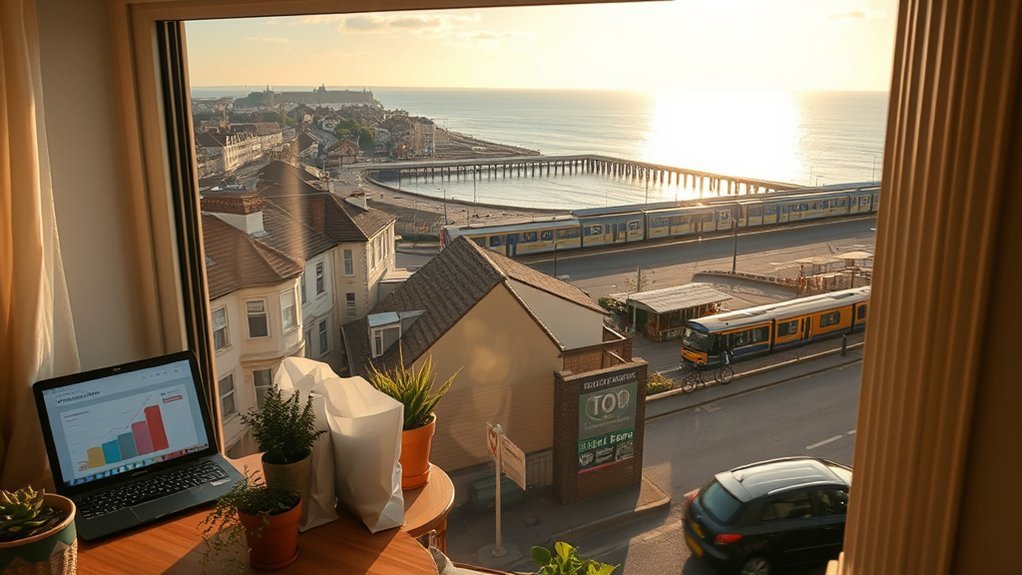You’ll typically pay about £900–£1,100/month for a one‑bed in Southend‑on‑Sea, with two‑ and three‑beds averaging £1,200–£1,800 depending on location and transport links. Budget utilities and broadband around £160–£200/month, groceries £150–£250, and public transport or petrol roughly £35–£79/month or higher if you commute. Expect pub meals ~£4–£6 a drink and eating out £30–£60 for two. Seasonal rents peak in summer; keep reading for practical saving tips and detailed breakdowns.
Monthly Rent and Housing Options in Southend-on-Sea
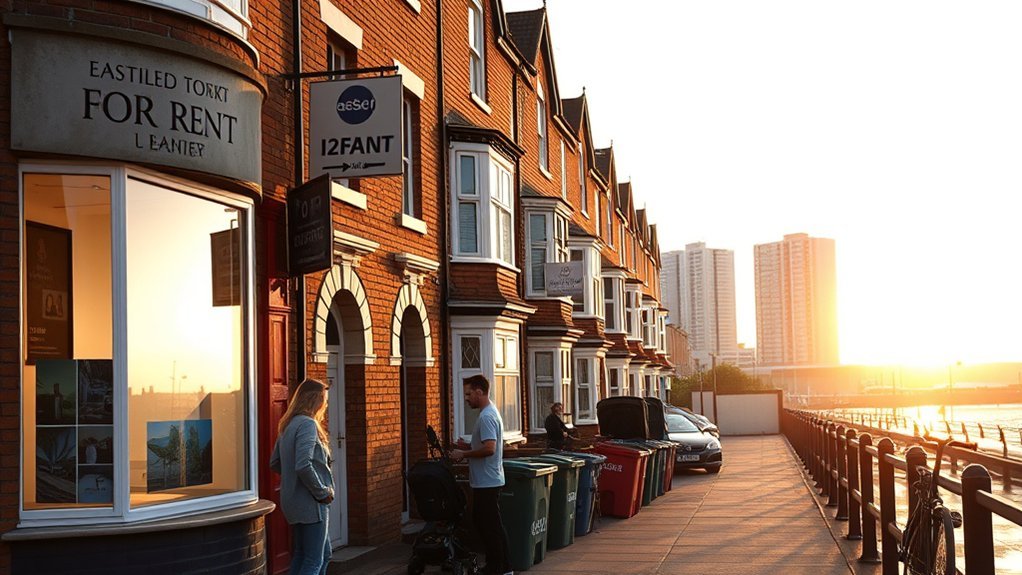
If you’re weighing housing in Southend-on-Sea, expect city-centre 1‑bed flats to run about £1,057/month (typical range £800–£1,271) and outside the centre about £733/month (range £350–£950); 3‑bed city-centre units average roughly £1,750/month (commonly £1,700–£1,800) while outside-centre 3‑beds sit near £1,800 (range £1,400–£2,500).
You’ll find analyses usually benchmark a 2‑bed, ~900 sq ft unfurnished higher‑quality apartment in city comparisons, so use that when weighing options.
If you’re prioritising proximity to transport and amenities, an Apartment in City will cost a premium but reduce commute time.
If space or schools matter, outside-centre 3‑beds can be competitive on a per-bedroom basis despite similar averages.
When deciding to rent or buy, factor local net salary levels (about £36,702 yearly) and current mortgage terms—20‑year fixed around 5.08%—into your monthly budget.
Focus on unit size, fittings, and location to match cost to needs rather than chasing averages alone.
Typical Utility Bills and Internet Costs
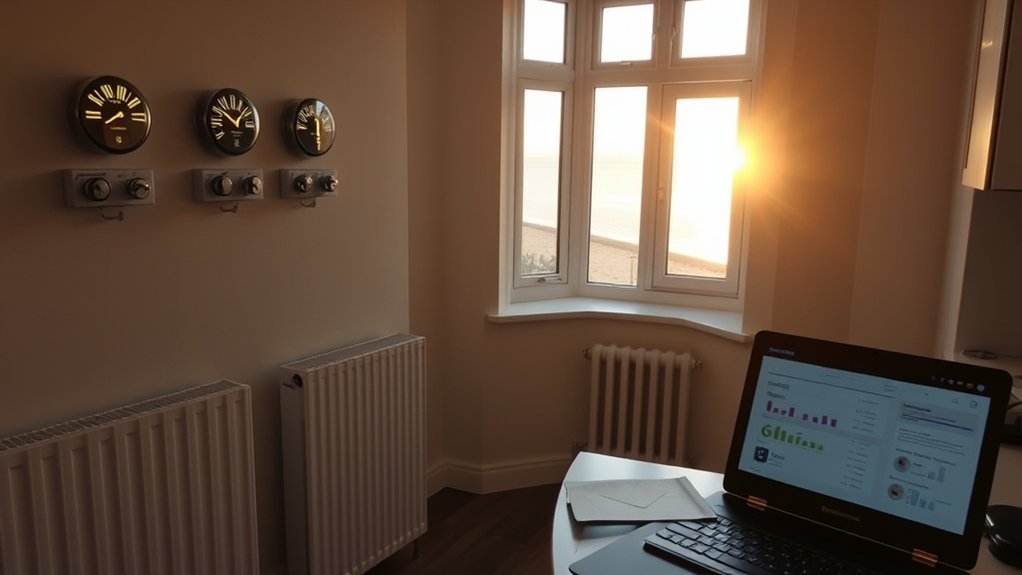
You can expect basic utilities for a ~915 sq ft flat to average about £127.50/month, though totals can rise to ~£550 in high-usage or cold months and more than double in poorly insulated homes.
Broadband (60 Mbps+) typically runs around £31.56/month (commonly £25–£40), and mobile plans with 10GB+ average about £12/month (≈£8–£35).
When budgeting, factor in one‑off setup or installation fees and occasional top‑ups or servicing that raise your effective monthly cost.
Average Monthly Utilities
Typically, basic utilities for a 915 sq ft (≈85 m²) flat—covering electricity, heating, water and rubbish—run about £127.50 per month, though seasonal heating can push that into the few-hundred-pound range in colder months. You should budget around £125–£135 monthly for core utilities as a baseline within your broader living expenses, with spikes possible during winter.
For planning, treat the reported upper-range (~£550) as an extreme, weather-driven outlier rather than the norm.
- Baseline utilities: ~£127.50/month (consensus £130–£135 for combined household costs)
- Winter/energy spikes: expect several-hundred-pound months when heating is heavy
- Planning buffer: add 10–30% to your baseline to cover seasonal volatility and avoid surprises
Internet and Mobile Plans
Often, your combined telecom costs in Southend-on-Sea will run modestly: a home broadband plan (60 Mbps+) averages about £31.56/month (range £25–£40) and a basic mobile plan with ~10 GB of data is roughly £12/month (range £8–£35), so budget around £43–£50/month for both as a practical baseline.
You should factor these into your overall living budget alongside average utilities (~£127.50/month for a small flat).
Shop providers for bundled promotions that lower costs for 6–12 months; switching at contract end can save more.
If you prefer pay-as-you-go, expect per-minute/text charges to vary by operator.
Compare allowances, speeds and upfront fees to pick the plan that matches your usage and keeps monthly telecoms predictable.
Grocery Prices and Weekly Food Budget

Work out a realistic weekly food budget by adding staple costs and a couple of protein/produce items: supermarket 1 kg chicken runs about £11–£12, a litre of whole milk is ~£4.13, a dozen eggs about £0.85, 1 kg tomatoes ~£2.94 and 1 kg apples ~£5.09. Use these unit prices to pick a simple weekly plan: eggs and milk for breakfasts, chicken for two dinners, and a couple of fruit/veg items.
- Staples: potatoes (£2.06/kg) and cheese (500 g ≈ £1.78) keep costs low.
- Proteins/produce: one kg chicken + 1 kg tomatoes or apples shapes the variable spend.
- Beverages/non-perishables: 0.5 L beer ≈ £0.78 or 2 L cola ≈ £1.96 add predictable amounts.
A modest weekly shop for one person typically falls between £15–£30. If you’re comparing locations, plug these figures into a cost of living calculator to scale weekly totals to monthly food budgets.
Eating Out, Cafés and Pub Prices

After planning a simple weekly shop, you’ll want to budget for the occasional meal out and coffee runs.
Eating out cost varies: a basic dinner for two in a neighbourhood pub is about £29, while a mid-range Italian or a three-course meal for two runs around £58–£60 (ranges £45–£100). If you pick fast food, a McMeal is roughly £7 (typically £6.50–£10).
Cafés show similar variation in Cost: a cappuccino in expat areas is about £2.66–£3.34, and regular cafés average £3–£4. Soft drinks (12 oz) generally cost £1.25–£3.00, and bottled water is about £1.00–£2.50.
Pub drinks follow: a pint/500 ml in a neighbourhood pub is around £4.33; draught domestic beer in midrange or expat-area pubs is roughly £4–£6. Use these figures to set a realistic monthly discretionary dining and beverage budget.
Transportation Costs: Public Transport, Taxi and Fuel

Getting around Southend-on-Sea is affordable if you plan ahead: a monthly public transport pass runs about £35–£79 depending on how much area you need, while single local fares typically cost £2–£4 (one-way bus tickets can go up to £5).
Getting around Southend-on-Sea is budget-friendly with monthly passes (£35–£79) or single fares (£2–£5).
You’ll save most by choosing a monthly Ticket (Local) pass if you commute regularly; pay-as-you-go is fine for occasional trips. Expect taxi rides (~8 km) to cost £16–£23 on business days, with short fares from about £4. Fuel is relatively pricey: petrol roughly £1.30–£1.45 per litre, so driving frequently adds up.
- Choose walking or cycling for short trips to cut costs and avoid seasonal surcharges.
- Buy a monthly pass when you travel daily across zones; it breaks even quickly versus single fares or taxis.
- Use taxis sparingly for convenience or late-night trips; factor surge and distance charges into budgets.
Plan routes and compare Ticket (Local) options to optimize your transport spending.
Healthcare, Medicine and Personal Care Expenses
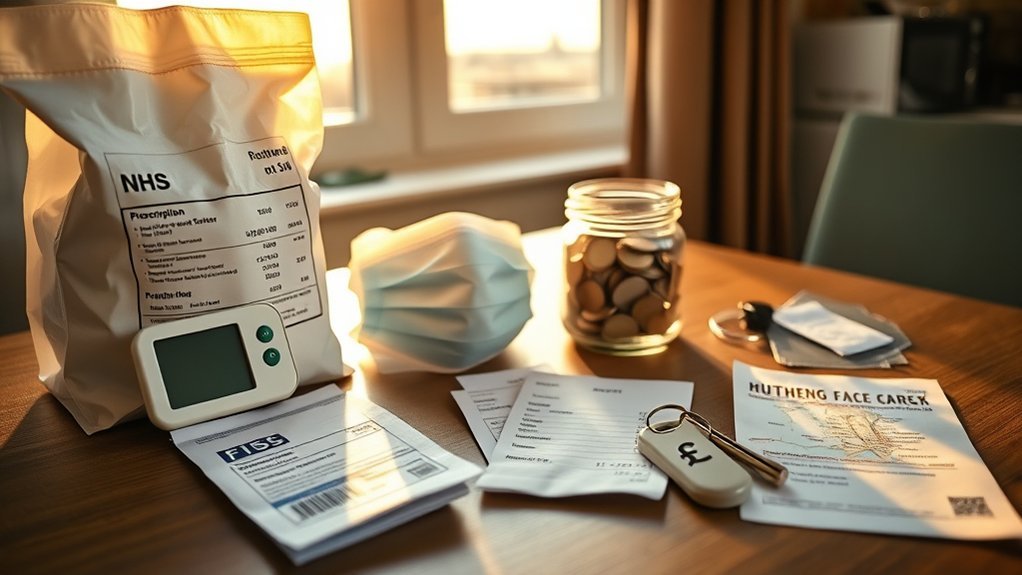
Expect to pay about £75 for a short private GP visit, with specialist or dental consultations often costing substantially more.
Prescription medicines can be much cheaper for eligible residents using the NHS, but visitors should budget retail prices (a box of common antibiotics ~£10).
Over‑the‑counter remedies and basic toiletries are low single digits per week (cold medicines ~£3–£5, shampoo ~£3.94).
Local GP Visit Costs
While NHS GP visits are free at the point of use for residents, you’ll pay about £75 for a private 15‑minute GP consultation in Southend-on-Sea, making private appointments a convenient but noticeably costlier option for visitors or those wanting faster access.
You’ll typically choose NHS care if eligible, but private consults give same‑day access at roughly £75 per Square appointment slot.
Routine personal care items are cheap: a six‑day course of OTC cold medicine is ~£3.39, basic wound dressings are low cost, and antibiotics (if prescribed privately) run about £10 for a basic 12‑dose box.
Be aware private prescriptions add to the fee; NHS prescriptions apply where eligible.
- Private GP: ~£75/15 min
- OTC cold medicine: ~£3.39
- Basic antibiotics box: ~£10
Prescription Medicine Prices
After considering GP visit costs, you should also factor in prescription medicine prices, which can change monthly expenses substantially.
Expect a short course of common cold medicine (six days) at about £3.39 and a 12-dose antibiotic box near £10 at local pharmacies. Non-generic prescription drugs often cost markedly more out-of-pocket than OTC options.
If you use private care, add roughly £75 for a 15-minute private doctor appointment that may be required for a private prescription, which raises overall medication spending for uninsured or non‑NHS users.
For budgeting, include repeat prescriptions or chronic‑medication costs—NHS eligibility or private prescriptions will materially alter your monthly prescription medicine prices, so track recurring versus one‑off purchases.
Over‑The‑Counter Remedies
You can usually pick up common over‑the‑counter remedies in Southend-on‑Sea for very little: a six‑day cold medicine runs about £3.39, basic painkillers and flu remedies are often under £5, and many cough syrups, antihistamines and topical creams are sold in supermarkets and pharmacies at similar prices.
You’ll find basic personal care items (toothpaste, shampoo, 3‑litre detergent) for £2–£6 and 4‑roll toilet paper near £1.88, so short self‑treatment is affordable compared with private GP fees (~£75 for a 15‑minute visit).
If you need antibiotics and don’t have NHS access, expect around £10 for a 12‑dose box. Keep routine shopping simple—don’t let impulse buys (like extra White Bread or premium brands) inflate your healthcare budget.
- Pharmacies stock essentials cheaply.
- Supermarkets match prices.
- NHS prescriptions still cheapest long term.
Entertainment, Gym and Leisure Activities

Explore Southend-on-Sea’s leisure scene and you’ll find costs that are generally reasonable but vary by activity and location.
If you’re living in Southend-on-Sea, a basic gym membership runs about £35–£45 monthly, aligning with regional averages. Cinema trips cost roughly £8–£12 per person, with occasional two-ticket deals near £25.
Dining out is affordable: a neighbourhood pub dinner for two averages £29, while a mid-range Italian in expat areas is about £58. Coffee and drinks vary — cappuccinos commonly cost £2.50–£3.50, and a pint is typically £4–£6 depending on the venue.
Family attractions and seasonal events can push weekly entertainment spending higher; tourist-style daily budgets have been cited near £150, so plan accordingly for outings to places like Adventure Island or Sea Life.
To manage costs, mix low-cost local options with occasional pricier experiences and track monthly leisure spending against your overall budget.
Childcare, Schooling and Family-Related Costs

Leisure choices affect family budgets, so it’s worth looking at childcare and schooling costs next. You’ll find the average cost of living for families in Southend-on-Sea varies widely: full-time nursery or childminder for an infant typically runs £800–£1,200/month, while free entitlement for 3– and 4‑year-olds (and some eligible 2‑year-olds) can cut hours-based costs noticeably.
Part-time wraparound or after-school clubs commonly cost about £60–£150/week. Private options are pricier: primary school fees from roughly £3,000–£4,000/term and short private nursery places £200–£500/week.
- Budget for recurring extras like uniforms, extracurriculars and trips (£20–£100+/month per child).
- Check eligibility for tax-free childcare or Universal Credit to offset childcare spending.
- Compare term-time vs full-year care to optimise monthly cash flow.
You should factor these figures into your monthly planning so the average cost of living you model reflects realistic family outgoings.
Money-Saving Tips and Budgeting Strategies
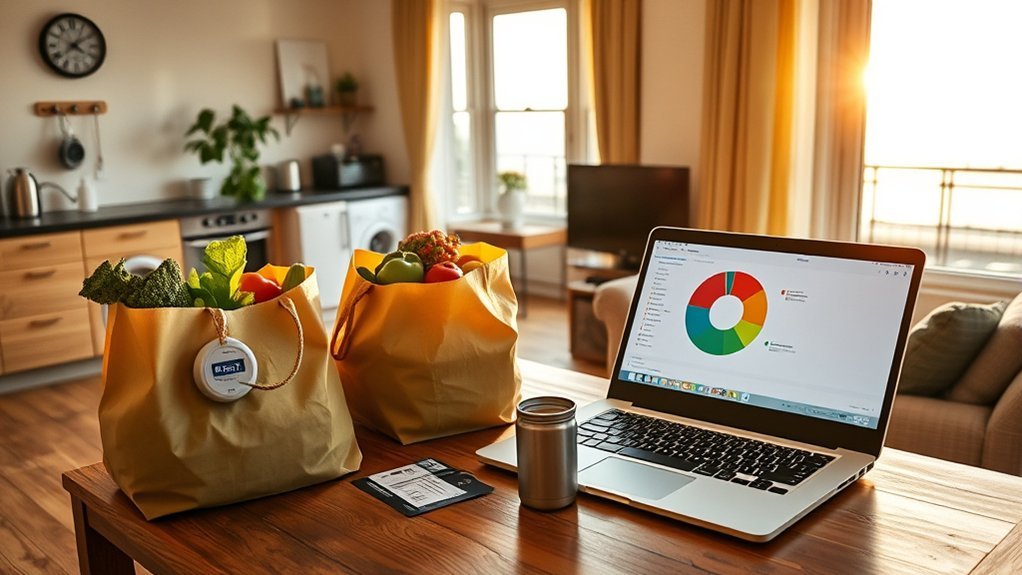
You can trim your monthly groceries to about £150–£250 by shopping supermarkets and markets (e.g., 1 kg potatoes £2.06, 12 eggs £0.85) and cooking at home instead of eating out.
Cut transport costs with a £79 monthly pass or by walking and cycling locally rather than taking frequent taxis (single 8 km taxi ≈ £16).
Reduce housing spend substantially by renting outside the city centre (example 1‑bed outside ≈ £733 vs city‑centre ≈ £1,057) and shift savings from bulk buys and tracked recurring costs toward rent or transport.
Smart Grocery Shopping
Cut your weekly grocery bill by building meals around cheap staples and seasonal produce: 1 kg potatoes (£2.06), 1 kg tomatoes (£2.94) and a dozen eggs (£0.85) will stretch further than ready-made options.
You’ll reduce goods and services spend by choosing larger packs and store brands—compare unit prices (500 g boneless chicken £5.54) to lower cost per kg.
Plan meals around inexpensive proteins and dairy (500 g cheese £1.78, 1 L milk £4.13), batch-cook, and freeze portions to cut waste.
Limit eating out—basic dinner for two ~£29—and keep a modest treat fund.
Shop with a running list, use weekly specials, and buy discounted larger bottles when sensible.
- Compare unit prices every trip
- Batch-cook and freeze portions
- Track specials and avoid impulse buys
Transport Cost Cuts
After tightening your food budget, look at transport next—small changes in how you travel can shave a large slice off monthly expenses.
Buy a monthly public transport pass (£35–£79) if you commute daily: it typically cuts per-trip cost 40–70% versus single fares.
Walk or cycle short trips in compact Southend to avoid ~£16 taxis for 8 km rides and frequent bus fares.
Use off-peak rail and book advance tickets for longer trips—advance rail can halve peak taxi costs.
Combine errands and use contactless or daily caps to stop multiple single tickets piling up.
Consider occasional car hire or rideshares for evenings; monthly passes plus occasional taxis usually beat running and parking a private car.
Monitor Interest Rate-linked credit costs if financing travel purchases.
Housing Budget Hacks
Look for a 1‑bed outside the city centre (average £733/month, range ~£350–£950) or share a 2–3‑bed to cut costs dramatically — a three‑way split of a £1,800 3‑bed can drop your rent to ~£600 each.
You’ll save an estimated monthly ~£300–£400 versus a city‑centre 1‑bed (~£1,057). Negotiate longer leases or off‑peak (autumn/winter) move‑ins to secure lower rates and avoid peak-season hikes.
- Prioritise flats near rail or walkable routes to reduce taxi spends (~£16 for 8 km) and avoid a £79 monthly pass.
- Split utilities and groceries; buying essentials locally (500 g chicken ~£5.54, 1 kg potatoes ~£2.06) lowers food per-person.
- Budget with a simple spreadsheet to track estimated monthly rent, bills, and savings goals.
When to Visit and Seasonal Price Variations

If you want the liveliest weather and attractions, visit in June–August, but be prepared to pay roughly double for accommodation and activities compared with off‑peak; book well in advance to avoid sharp price hikes for hotels and vacation rentals. Southend-on-Sea compares favorably to many cities in the world regarding predictable seasonality within the United Kingdom: summer draws crowds and demand-driven rates.
Visit in shoulder seasons (March–May, September–October) and you’ll get better weather and noticeably lower hotel and rental prices than in high summer. Winter (November–February, excluding Christmas/New Year) is cheapest; nightly rates can drop to about half peak prices, so you can cut short-term living costs substantially.
If you’re a remote worker, expect around USD 3,400 monthly when staying short-term, but longer leases or off‑peak timing will reduce that figure. Plan and book according to seasonality to optimize comfort versus cost, and lock in accommodations early for any summer travel.
Frequently Asked Questions
What Is the Average Cost of Living in the UK Including Rent?
You’d expect national averages for UK cost of living including rent around £1,800–£2,000 monthly per person; that’s data‑driven, practical guidance, using median incomes and typical rents to plan realistic household budgets.
What Does the Average Cost of Living Include?
It includes housing (rent), essential utilities, internet, food and groceries, transport, healthcare, insurance, personal care, household items, entertainment and miscellaneous costs—you’ll use these categories to calculate realistic monthly living expenses.
Is the Cost of Living Higher in the US or UK?
Like a tide pulling at your wallet, it’s generally higher in the US; Currency Comparison shows US wages can be larger, but housing, healthcare, and transport often outpace UK costs, so you’ll usually pay more overall.
Is There Much to Do in Southend-On-Sea?
Yes — you’ll find plenty: seafront events, the 1.34-mile pier, beaches for walking and kitesurfing, Adventure Island, aquarium, gardens, museums, festivals, live music venues, family arcades and boat trips for varied coastal breaks.
Conclusion
You can live in Southend-on-Sea on a modest budget if you plan carefully: rent and utilities are your biggest costs, groceries and eating out are moderate, and transport and leisure add predictable extras. Like a well-tuned timetable, a clear budget keeps everything running smoothly. Use cheaper supermarkets, share housing, and buy season tickets to cut costs. Track spending weekly, prioritize essentials, and adjust habits to match your income and lifestyle.

